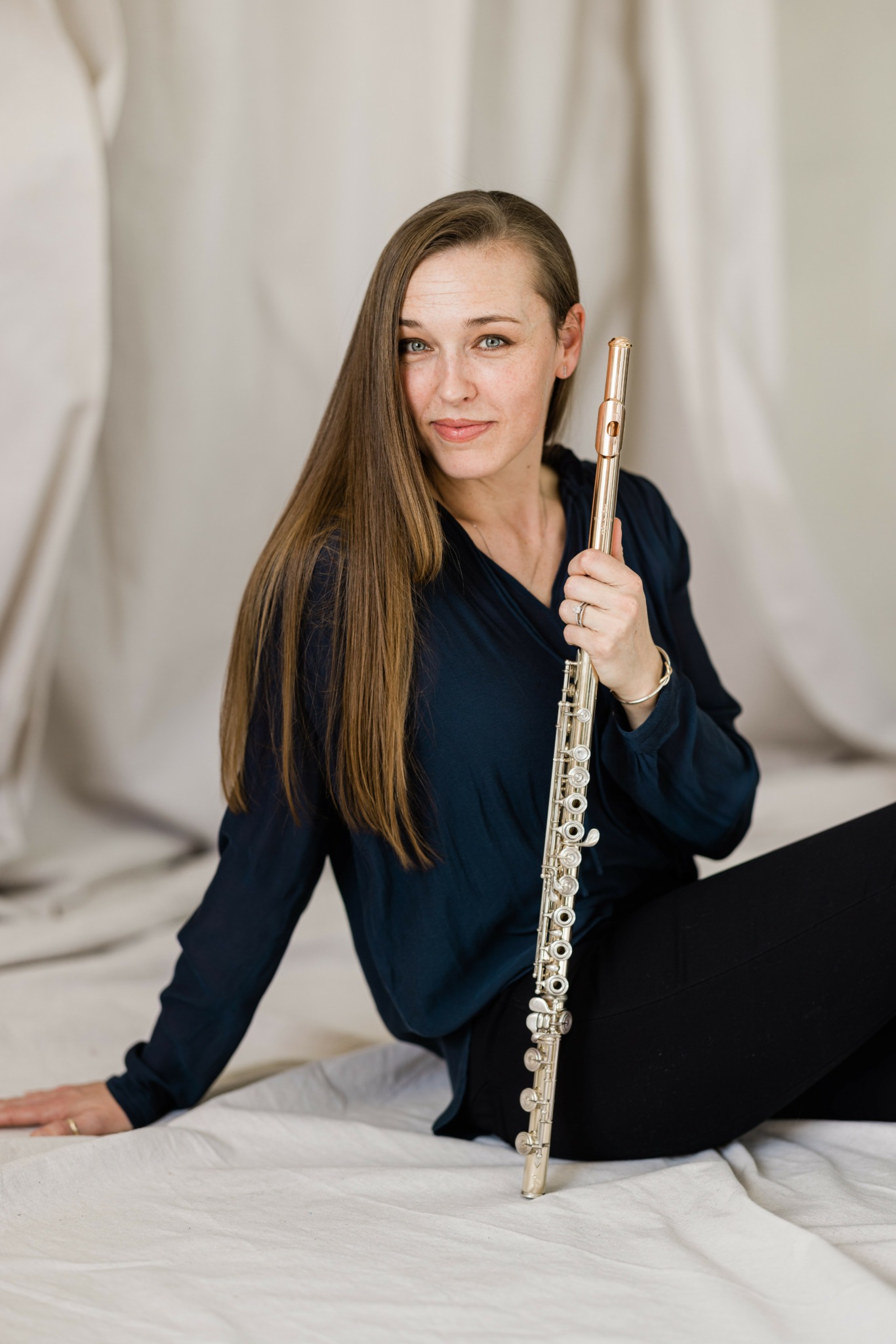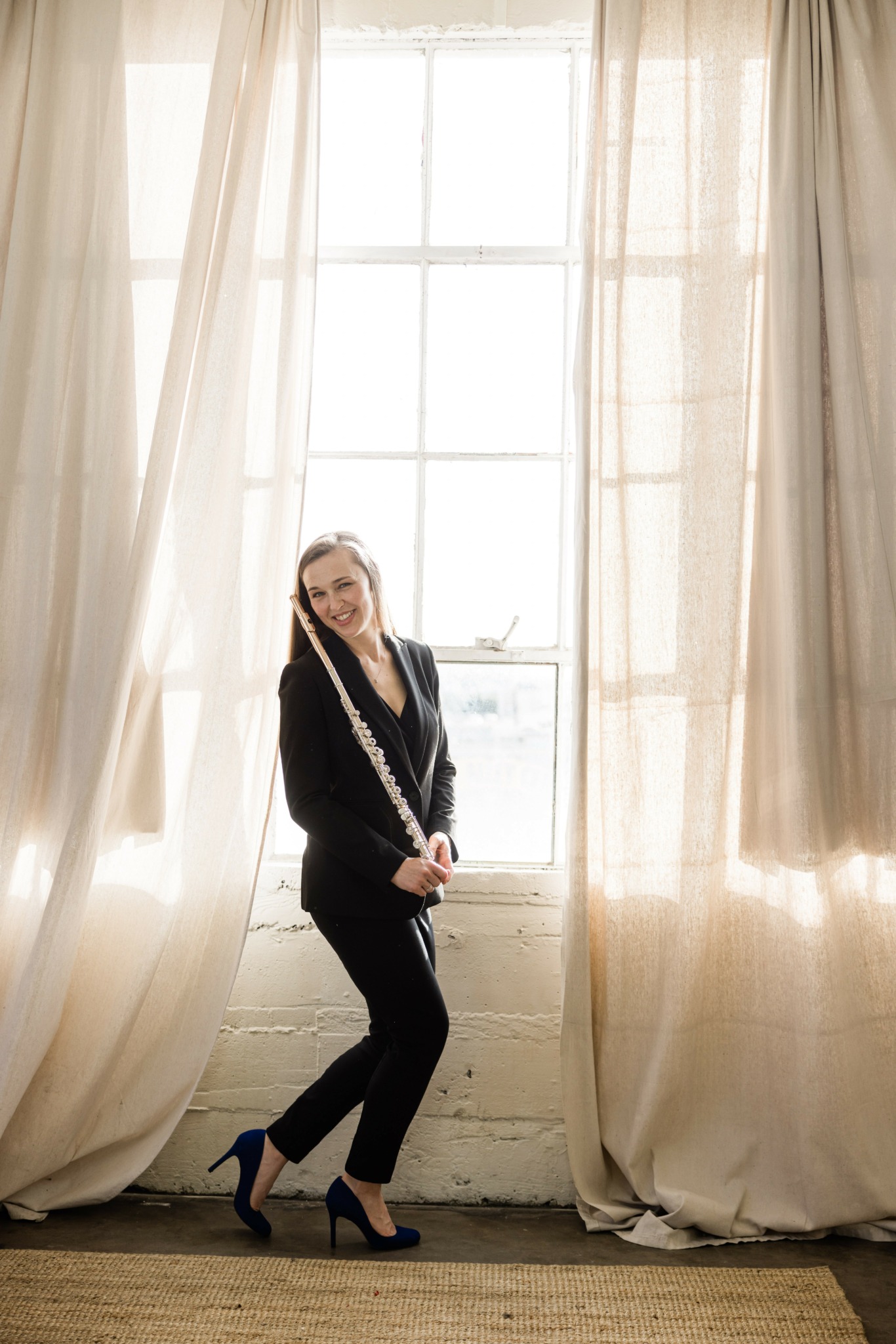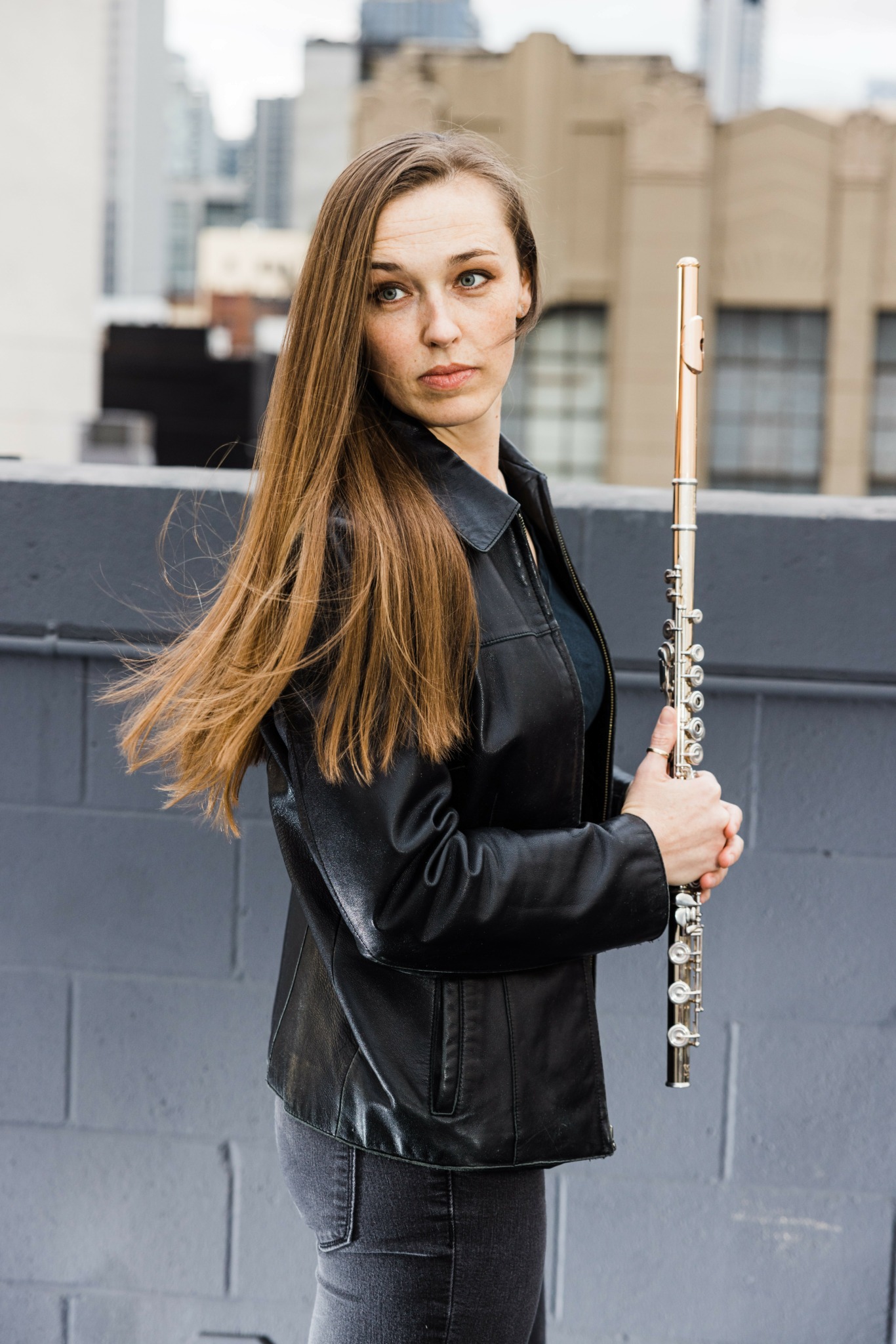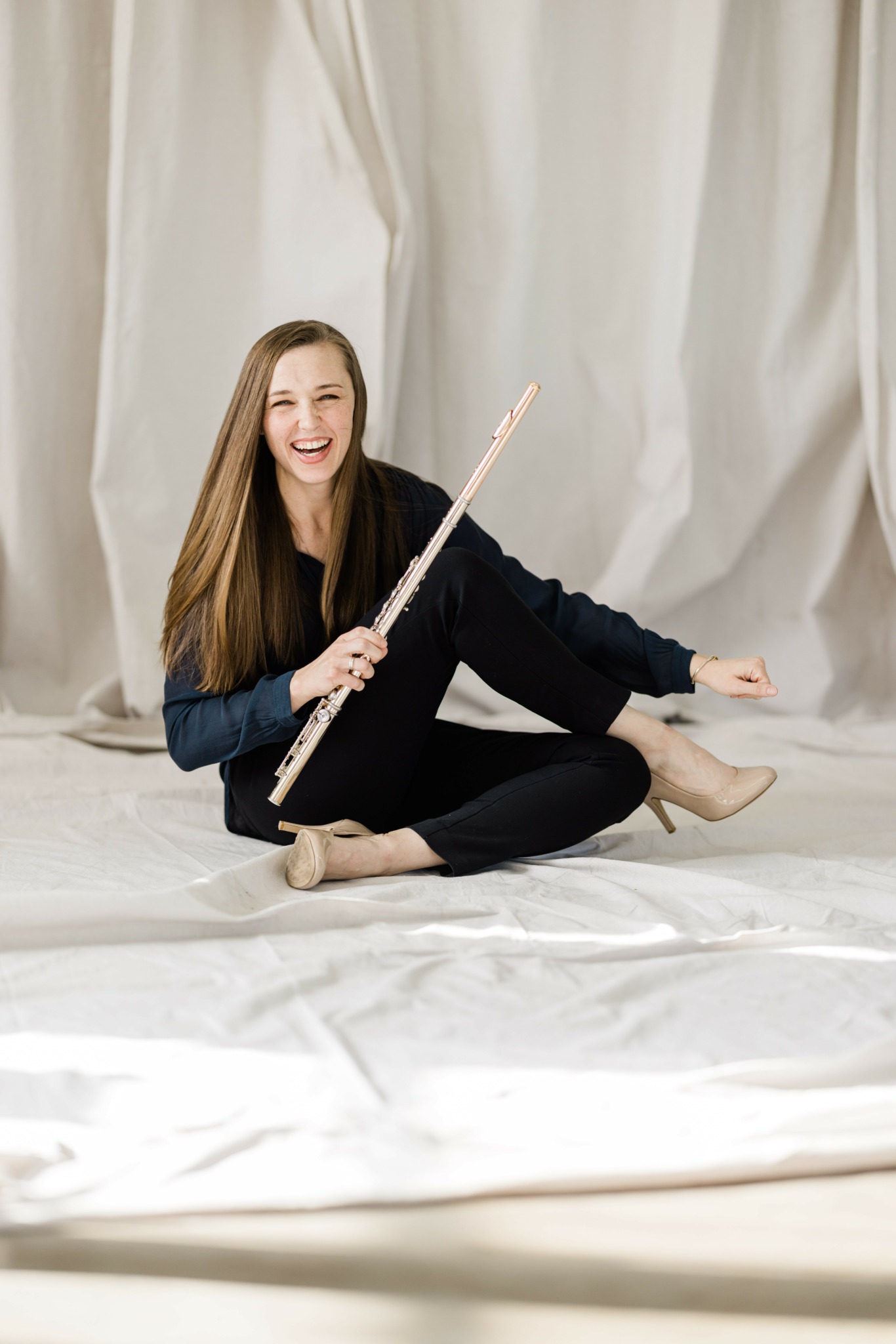We recently connected with Sandy Hughes and have shared our conversation below.
Hi Sandy, thanks for joining us today. How did you learn to do what you do? Knowing what you know now, what could you have done to speed up your learning process? What skills do you think were most essential? What obstacles stood in the way of learning more?
During my undergraduate flute studies at the Hartt School of Music, my professor, John Wion, who served as Principal Flute of the New York City Opera for more than three decades, advised early on to find a good piccolo and learn to play it well. Taking this advice set me up for success. Flute was my main serious instrument, but piccolo was something I experimented with on the side for fun. And over time, the piccolo became something joyful, an escape even, and eventually a specialized skill. I fell in love with the sound and the soloistic role of the piccolo, and I am fortunate that it has been my ticket into all sorts of rooms where incredible music was being made.
In grad school at the Manhattan School of Music, I was blessed with the chance to study with both Robert Langevin, Principal Flute of the New York Philharmonic, as well as his colleague Renee Siebert, the former Second Flute of the New York Philharmonic. Their professional working relationship was incredible to witness. Robert required that we study all the major orchestral repertoire under Renee’s tutelage, with the distinct perspective of a second player. I learned when to rise equal to my principal colleague, to soar over the orchestra together, when to shadow them, blending effortlessly inside their sound, and finally when to bring out the lower octave and be able to do so loudly enough to fill out the harmonic overtones and create a well-balanced section sound. It is an art all unto itself, and frankly one that I feel goes largely untaught at major conservatories because of the widely held view that second players are somehow less. In truth, they are absolutely essential and part of a greater whole that does not exist without every musician on the stage. It is hardly a coincidence that the four of us who had the opportunity to study with both Robert and Renee at the same time are now the current second flutists in the New York Philharmonic, Chicago Symphony, Detroit Symphony, and LA Chamber Orchestra. I have a dream to re-create such a program for grad students here in Los Angeles; I have a sneaky suspicion I may somehow manage it!

Sandy, before we move on to more of these sorts of questions, can you take some time to bring our readers up to speed on you and what you do?
For most of my professional life the answer to this question has been: my name is Sandy Hughes, and I am second flute and piccolo for the Los Angeles Chamber Orchestra. It is an identity and a title of which I am extremely proud, given to me by our fantastic former Music Director, Jeffrey Kahane. And while I think I was always destined to end up in a chamber orchestra or ensemble, it was the discovery, cultivation, and combination of my unique set of strengths and skills that has brought my career and creative life to what it is now.
I spent five seasons performing across the country and throughout Europe with the New York Philharmonic and have also appeared with the Chicago, Atlanta, San Diego, and Pacific Symphonies to name a few. My recording work may be heard across many forms of entertainment including the Star Wars and Star Trek franchises as well as for TV series such as Family Guy, American Dad, and Mozart in the Jungle, the video game League of Legends, and on various other documentaries and feature films. In the summers I have been fortunate to perform at a number of prestigious festivals including Aspen, Bravo Vail, Mainly Mozart, Orcas Island, Ravinia, and Tanglewood.
I began my musical studies on the piano at the age of four. The piano is a solo instrument with the capability of carrying both the melody and supporting voices across both hands. The difficult task of finding when to bring what musical line out to the listener was one I wholeheartedly embraced as a child. Around the same time I began ballet lessons, and dance and movement remained a huge part of my life well into my college years. As a self-proclaimed bookworm from the beginning, the distinct stories of the side character and the unsung hero always fascinated me. I pursued an English Literature degree alongside Flute Performance, while moonlighting across campus as a member of the University of Hartford Hawks Dance Team. While I fully intended to become a full-time writer—my dancing just for fun, and my music scholarship supporting my “real” education—somewhere along the road of life the path shifted, and I became a professional flutist instead.
Because I had so many opportunities throughout my life to express myself through writing and speaking, dancing, and music performance, I developed a synthesis of communication styles completely unique to me. I am so grateful that I maintained connection to all these disciplines because each one brought me into contact with so many different types of people and communicators.
I am currently the orchestra committee chair for the Los Angeles Chamber Orchestra, serving as a representative for the musicians as well as a liaison to our Board of Directors and our Management team. I am also a member of the Strategic Planning Committee and Artistic Advisory Committee for LACO, both comprised of members from all three branches of our organization. I find the roles of communicator, conduit, and advocate incredibly fulfilling. The ability to bridge the gap and bring people together has never felt more necessary than at present. It is both personally and professionally a role I was born to fill, to gather resources and skills to communicate and create our way to a better future.

Is there mission driving your creative journey?
I believe connection, communication, and mutual understanding breeds true empathy and compassion. When we understand the challenges of our colleagues, the silos that separate us come down and true collaboration occurs. Whether I am on the stage, in the recording studio, in a board room, or parenting the next generation, it drives everything I do.

We often hear about learning lessons – but just as important is unlearning lessons. Have you ever had to unlearn a lesson?
Throughout my seven years of conservatory education, the top prize for playing well in placement auditions was the principal position in the school orchestra. I often found myself as the youngest or least experienced player at the various summer festivals and flute studios where I studied, so the second flute and piccolo parts fell to me. Rather than seeing this as a disappointment, I saw it as a unique challenge. Thankfully piccolo was an early love that only grew with time!
The lesson I had to unlearn was that principal was “better” than either of these other roles. In fact, for myself I have found the opposite to be true. I do enjoy the opportunity to take the melody and shine on my own, either in small ensembles of three or four in chamber music or when the piccolo comes to the fore in the orchestra. But it is the collaborative and supportive role of the inner voice that truly suits my personality and has driven all my creative efforts throughout my life in every role I play: musician, communicator, advocate, and mother.
Contact Info:
- Website: https://sandyhughes.net
- Instagram: @hughes.sandy
- Other: https://laco.org/people/sandy-hughes/

Image Credits
Inda Reid


